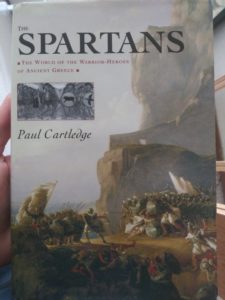Paul Cartledge’s history of the Ancient Spartans delves mainly into the famous people and events and deeply explores the causes and connections between these people and events. His book is a rare treat of history book where the author’s own interest and enthusiasm are apparent; in contrast to history books so focused on getting facts correct and political correctness that they are monotone and bare, and consequently, boring.
So much so, that Paul’s book reads like a riveting fictional story that catches your attention up until the end. It will be the first history book, though it is a short one, that I’ve read in three days; compared to the normal weeks I spend on others.
More so than most, and for good reason, Pual goes into detail of the role women played in Ancient Sparta. Spartan women are famous for their autonomy; it is thought they were given a formal education and readily encouraged to physically train. As is the case, the Spartans believed that fitter and healthier women had healthier births and babies. Though Spartan Women did not hold the top positions, that had much sway and voice in decisions, and were not seen as inferiors. Unlike their fellow Greek cities, women were not given less consideration in food shortages or female babies given less chance to live and thrive. Famously, the Spartan Queen Gorgo in reply to a comment on the freedom and power of Spartan women, said it was because they were the only women who gave birth to men, that is, “real men.”
Which by real men, she meant the men of Spartan who went through the Agoge training program and lifestyle of Sparta that produced the famous Spartan Hoplites. These “Spartans” were those distinguished 300, with the roughly 3500 hoplites who joined from neighboring cities, who held against the Persian invasion by king Xerxes for three(four?) days, lead by the Spartan King Leonidas the first. This is reasoned to have been the battle that won the war, despite it being a defeat; for it improved the morale of the Greeks by showing how, even with Persia’s numberless force, a handful of Greeks could inflict relatively large damage in comparison to their numbers and hold for as long as they did.
Well, as you can see, a good book. If you have ever had an interest in their relative beginning with Menelaus to the “ending” with the rise of Rome and all in between, and how it all connects, this is the book for you.
